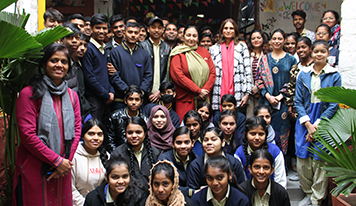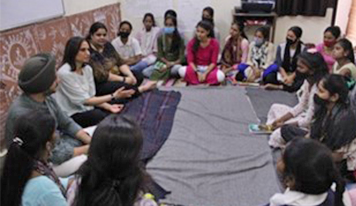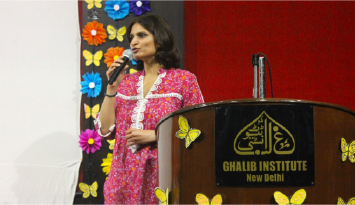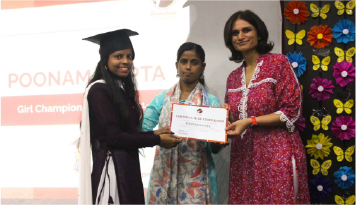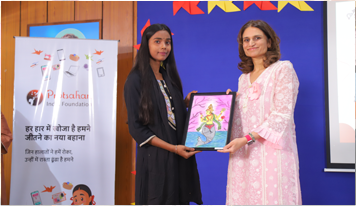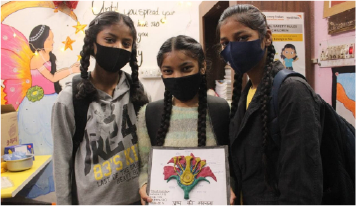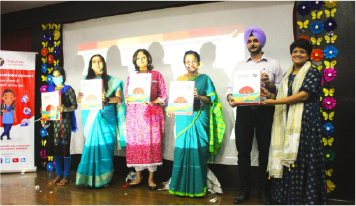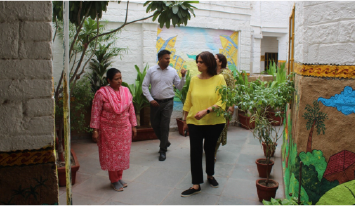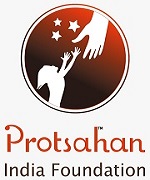Sharing some of the stories that touched our hearts
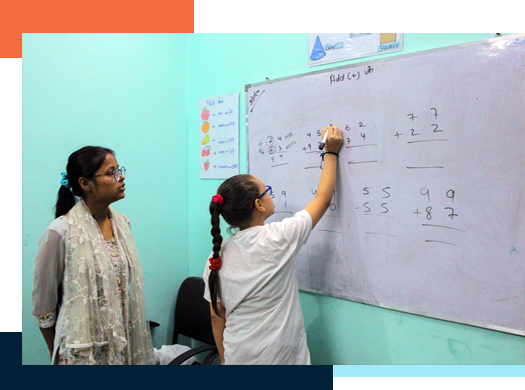
Geeta has been coming to the Protsahan Girl Empowerment Centre for more than a year. Her father passed away due to Covid-19, and she resides with her mother and younger brother. Since her mother is the sole bread earner of the family and works as a domestic helper, Geeta occasionally goes with her to help with household work, as the family faces extreme financial constraints due to an unstable working environment. Due to their financial situation, Geeta was unable to her spectacles repaired and used tape to fix them to be able to use them as long as possible. She also needed a school bag to carry her books to school. When Samina, a Protsahan Youth Peer Leader saw how Geeta needed new spectacles for her weak eyesight, she promptly nominated her for a needs-based equity scholarship. With this she purchased new spectacles and a much-needed school bag, relieving the financial burden on her mother and empowering her to continue her studies with renewed confidence.
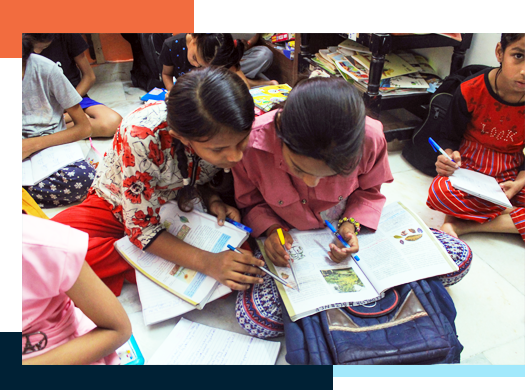
A mother and daughter sought refuge at Protsahan's Girl Empowerment Center due to ongoing domestic violence. The daughter disclosed a distressing incident where she witnessed her father physically assaulting her mother. When she intervened to save her mother, the father bit off a part of her arm. Fearing for their safety, the mother expressed her determination to report the abuse to authorities and break free from this cycle of violence. Understanding the urgency of the situation, Protsahan social workers worked tirelessly to de-escalate the situation and empower the victims to seek justice. They also provided psychosocial support to both, creating a safe space for them to share their experiences and voice their fears. The social workers collaborated with relevant authorities, including the Police and local woman organisations to ensure accurate reporting of the violence. In addition to crisis intervention, Protsahan offered a range of counselling support services tailored to the victim’s needs. This included first aid counselling and comprehensive support services aimed at empowering them to rebuild their lives free from intimate partner violence at all three levels of social work, at an individual level with Mahila Panchayat (women associations) and Police reporting, community level through Slum Panchayats (associations), and at a policy level with the Delhi Commission of Women. Protsahan continues to offer ongoing support and guidance as they navigate their journey towards a life free of violence, equipped with agency, healing, and empowerment
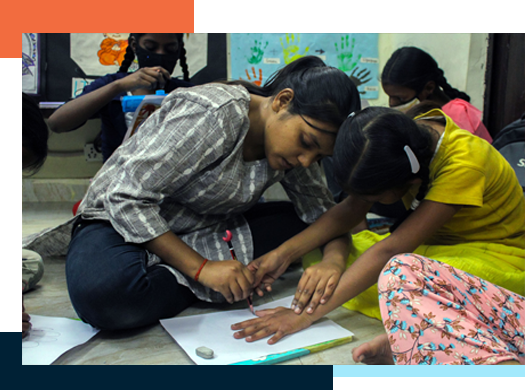
Niti lived with her family in the Delhi slum area of Uttam Nagar. Her father is a ragpicker and she has 3 elder brothers, 2 of whom go to school, and one helps her father with his work. After the recent demise of her mother being a girl, the entire responsibility of caregiving and household chores fell upon her. She is in the 9th standard at school and this change of circumstances led to irregularity at school and increased her risk of dropping out of the Protsahan Girl Empowerment Centre. The child protection officer at Protsahan gauged the situation and promptly started conducting home visits to counsel her father. After regular home visits and intervention by the team, Niti’s father agreed to help her with morning chores so she could at least attend school and gradually resume coming to the centre. She continues to receive ongoing psycho-social counselling to help process the grief of her mother's recent passing, and her father continues to help with household work. She also leaves the centre early to manage her chores and schoolwork. The psychosocial support and regular intervention helped prevented Niti from dropping out of school, challenged gender norms, and equipped her to balance her well-being, and school while negotiating the household responsibilities with her father.
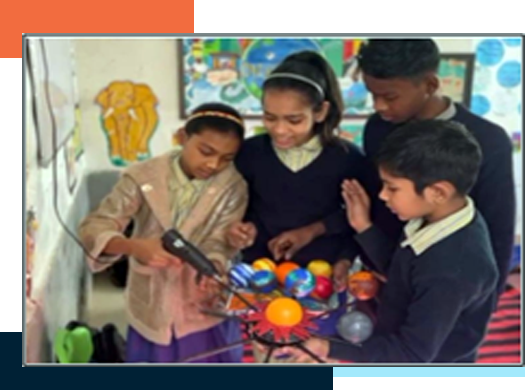
Ratna relocated from Kolkata to Delhi amid the Covid-19 pandemic. She faced linguistic barriers upon moving and felt very challenged in a new environment. Reflecting on those early days, Ratna fondly recalls her apprehension about fitting in at school. "At first, I felt like a fish out of water," she reminisces. But she also shares how "My teachers encouraged me to step out of my comfort zone. They believed in me even when I doubted myself." At Katha Lab School she got guidance from her teachers on how to acclimatize into a Hindi speaking environment, and integrate with fellow Bengali peers. Participating in school cultural and annual events, ignited her passion for dance, and now she utilizes online tutorials and Bengali music to refine her skills, while also enthusiastically participating in STEM endeavours and extracurricular activities. Her journey shows the transformative power of teachers and community support in fostering growth and ambition.
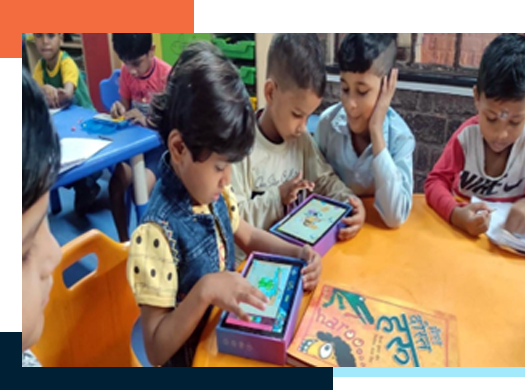
Shreya’s parents moved to Delhi seeking better opportunities. Initially reserved, upon joining Katha lab school, she slowly opened up to her teachers, discovering her affinity for craft projects and actively engaging with her peers. She also developed her passion for storytelling inspired by her mother’s encouragement to share the stories she had heard at school with her family. She discovered an interest in computers, encouraged by her father’s work with computers, and this led her to participate in computer classes enthusiastically learning to identify computer parts and pain applications. Despite her initial shyness, Shreya embraced opportunities to inspire and lead others, demonstrating the importance of providing opportunities for growing and fostering talent in a supportive school environment for ultimately shaping individuals from underprivileged backgrounds become confident and capable leaders for tomorrow.
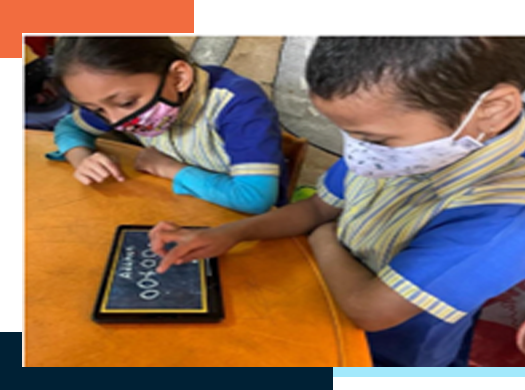
Seema from Class 2 of Katha Lab School comes from a family of 6 sisters. Her parents moved to the Govindpuri slums of Delhi 4 years back to earn money to support their family. They enrolled the girls at Katha Lab School and when they were taken out of school during Covid-19 pandemic, the teachers found a safe space in the community to continue to teach Seema and the other children of the nearby area, outside of school. They continued to engage the children in creative work and give them assignments. This continued interaction with the children along with counselling to their mother, helped convince their parents to send the girls back to school after the pandemic ended. Today Seema’s mother helps her with her schoolwork and Seema continues her education along with her sisters. Seema is always happy and enjoys time with her friends.


